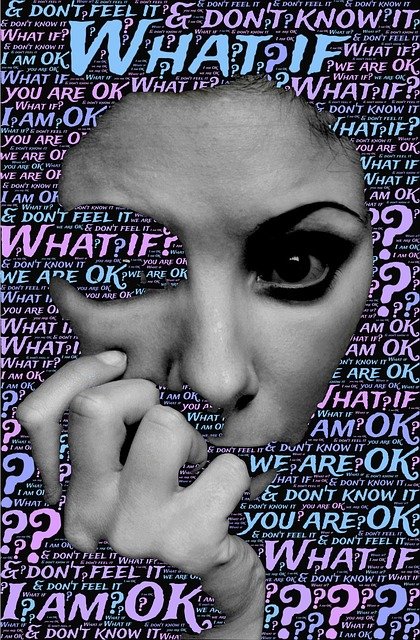What is the meaning of anxious? How common are anxiety disorders? Everyone experiences anxiety of some sort.
What Is The Reason Behind Our Anxious Feelings?
Each of us has to define the reason behind our stress and anxiety. Writing down and answering a few questions may help.
- Sit and feel what is bothering you?
- Recognize the thoughts at the core of your stress?
- Feel your emotions; what is the fear behind anxious feelings?
- What is your mind saying when you lay down to sleep? What are those pesky anxious thoughts that keep you awake?
- Do your anxious thoughts, stress, and anxiety come with the present reason behind them?
- Are your anxious thoughts present daily, and you don’t know why?
- Is your anxiety controlling your life by stopping you from truly living?
Do You Have An Anxiety Disorder?
Becoming overly anxious daily may be an anxiety disorder. Anxiety disorders are prevalent. There are about 40 million Americans who live with an anxiety disorder, so you are not alone. Anxiety disorders are more than the occasional worry or fear. Let’s look at the different types and how they affect us.
Generalized Anxiety Disorder: Anxious Meaning
You have probably heard of Generalized Anxiety Disorder, GAD. This type of anxiety disorder causes chronic worry even when nothing provokes it. Meaning your mind is focused on what tomorrow may bring. When we focus and stress this way, it is irrational thoughts about the unknown. We spend our time worrying and stressing about something we cannot control. The unknown does not exist. Meaning tomorrow has not happened yet, next week or next month.
GAD is a disorder characterized by chronic anxiety and worry. Anxiety is more than mental stress; as a result, it can cause physical illness when chronic. It’s common for individuals suffering from GAD to have these symptoms.
- Feelings of impending doom or dread.
- Irritability with others in the household who experience no such symptoms.
- Individuals are usually over-anxious at work.
- Sleep difficulties (insomnia)
- Bouts of frequent fatigue.
- Individuals suffer headaches, muscle tension, and pain throughout their bodies.
Panic Disorder
Individuals who suffer from panic disorder experience frequent and unexpected episodes of intense fear accompanied by physical symptoms such as,
- Chest pain
- Heart palpitations
- Shortness of breath.
- Individuals can genuinely believe they are dying, but they are in fight or flight mode.
- Panic disorders can bring people to their knees and freeze in fear, making it difficult to function on standard terms.
Social Disorders-anxious
Social Anxiety Disorder is living with overwhelming fear and excessive self-consciousness in everyday social situations. The severity of this varies from not being able to function well in certain types of settings, such as,
- Speaking at formal or informal gatherings.
- I feel a lack of control over any situation around others.
- Eating in front of others.
- Some individuals cannot go into public at all.
- In its most severe form, individual experiences may be so broad that a person experiences symptoms almost anytime they are around other people.
Post Traumatic Stress Disorder or (PTSD)
It would be terrifying if you could use one word to describe Post-Traumatic Stress Disorder. PTSD is an anxiety disorder that can develop after exposure to a traumatic event or ordeal where grave physical harm occurred or life threatened. Traumatic events may include,
- Violent personal assaults.
- Natural disasters such as earthquakes and tsunamis.
- Accidents like a car crash and falls from heights.
- In military combat situations, the person is in constant fight or flight for long periods.
- Severe experienced injury on either themselves or another.
Obsessive-Compulsive Disorder (OCD)-anxious
Obsessive-Compulsive Disorder, OCD, is an anxiety disorder characterized by recurrent, unwanted thoughts (obsessions) or repetitive behaviors (compulsions). Repetitive behaviors such as,
- Hand washing
- Counting
- Checking or cleaning.
- Nothing can be out of order or its place in the home or elsewhere.
- Compulsive behaviors are often performed with the hope of preventing obsessive thoughts or trying to make them go away.
However, performing these so-called “rituals” provides only temporary relief, and not performing them increases the individuals’ anxiety level.
How to Stop Feeling Anxious Right Now
Long-term strategies to cope with anxiety may include talk therapy medication. Everyone can benefit from other ways of reducing stress and anxiety; meditation and yoga are great healthy ways to deal with anxiety and stress. You are eating a well-balanced diet, limiting alcohol consumption and caffeine intake, and taking time for yourself each day. There are steps you can take when anxiety starts to take hold.
Try These Methods to Reduce Stress and Anxiety, as Recommended by Experts.
Here are a few suggestions to relax your mind and help you regain control of your thoughts.
- Anxiety is a future-oriented state of mind. Instead of worrying about what will happen, pull yourself back to the present moment—focusing on what is happening right now.
Ask yourself some questions,
- What’s happening right now?
- Am I safe?
- Is there something I need to do right now? If not, make an “appointment” to check in with yourself later in the day to revisit your worries, so those distant scenarios don’t throw you off track.
It is not uncommon for people with panic attacks to feel like dying or having a heart attack. Remind yourself- “I have a panic attack, but it’s harmless, it’s temporary, and there’s nothing I need to do.” Plus, remember that this response does the opposite of impending signal death. Instead, the body activates its fight-or-flight system, which is your body’s mechanism to help you survive.
Check-in With Your Thoughts, Are They Factual?
As a person with anxiety, they are always worried about the worse things that may happen. For example, if I’m presenting at work today, people will probably think my presentation sucks or hate me. To help eliminate these worries and anxieties, we should be realistic instead of pessimistic in our thoughts. Therefore, change your self-talk to say, “I am prepared for this” and “I am ready” instead of thinking, “This is going to suck.”
People often focus on worst-case scenarios when they have anxiety. Therefore this can make it harder than necessary to cope with their fears. We need to change our thinking patterns. Keeping our thoughts to the positive outcome instead of preassuming it will end badly. For many, go well too! Repeating positive affirmations trains us to be more optimistic and less anxious. The more we practice, the more positive experiences and outcomes we have.
Do something, anything, such as:

- Walk around, even if you have to pace for a few minutes. Movement interrupts your train of thought and helps you regain a sense of control.
Our brain is a powerful tool that can take us to places we dream of and leave reality behind. If you find yourself feeling overwhelmed, try this simple “mind trick” the next time things get hectic:
- Look around your surroundings
- Name three objects nearby (e.g., pencils on the desk)
- Identify three sounds near or within earshot (pen clicking against the paper)
- Move parts of your body such as an ankle or finger…Just by identifying these four events happening simultaneously with 100% awareness. This action creates new space for our minds. As a result, given it just enough breathing room to calm down from its constant racing state!
Stand up straight with an open chest.
When we are anxious, our body protects the part of us where all of our vital organs lie — by hunching over for an immediate physical antidote to this natural reaction.
- Pull your shoulders back and open up your chest so your body will start sensing everything is under control.
Take deep breaths in and out.
Deep breathing helps you focus and calm down. At the same time, the number of breaths is not essential. Instead, take deep inhales and exhales consistently for best results. You are breathing in through your nose and out your mouth. Helping you slow your mind while re-centering your whole system.
Meditation: How To Rewire Your Anxious Brain with Meditation
Meditation can help and teach you how to control your thoughts and panic mind instead of it controlling you. You can learn to become calm and free from overwhelming stress and anxiety. Guided meditation is practiced daily for 10 minutes with the proper technique for you to live a more peaceful, accessible, and centered life. Less stress, anxiety, and panic, for they melt away. You learn valuable tools and skills to handle them, so they never retake control of you. You stay in power, not the unrealistic thoughts, panic, and emotions that run wild in our thoughts.
Stop letting stress and anxiety control and limit your life.
Click the button below for more information on the online Master Your Mind meditation course. Take back control and relieve yourself from feeling anxious, stressed, and panicked.
The Master Your Mind Meditation Course
Click the Button Below Now! and Live Your Best Life!

Disclosure: Bear in mind the links above in this post are affiliate links, and if you make a purchase, I will earn a commission at no extra cost. Keep in mind that I link this company and its products because of their quality and positive impact on people’s lives, not because of the commission I receive from your purchases. The decision is yours, and whether or not you decide to buy something is entirely up to you.
More Resources:
How To Make Change In Life
https://1111newme.com/20 21/05/23/change-or-not-to-change-how-to-make-change-in-your-life/
Source:
How to stop feeling anxiety now https://www.webmd.com/mental-health/features/ways-to-reduce-anxiety
What are five anxiety disorders https://www.hhs.gov/answers/mental-health-and-substance-abuse/what-are-the-five-major-types-of-anxiety-disorders/index.html

